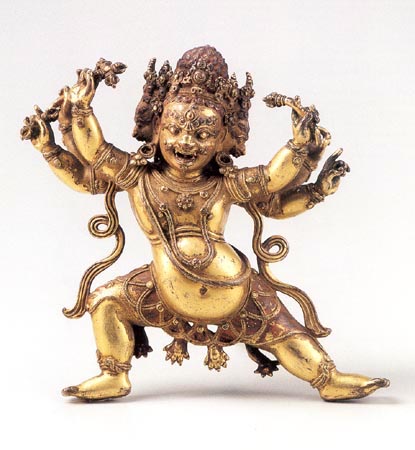Ucchusma: Difference between revisions
Jump to navigation
Jump to search
Stefan Mang (talk | contribs) No edit summary |
Stefan Mang (talk | contribs) No edit summary |
||
| Line 8: | Line 8: | ||
==Notes== | ==Notes== | ||
<small><references/></small> | <small><references/></small> | ||
==References== | |||
*Sanderson, Alexis. "Atharvavedinsin Tantric Territory: The Āṅgirasakalpa Texts of the Oriya Paippalādins and their Connection with the Trika and the Kālīkula, With critical editions of the Parājapavidhi, the Parāmantravidhi, and the *Bhadrakālīmantravidhiprakaraṇa." In The Atharvavedaandits Paippalāda Śākhā: Historical and Philological Papers on a Vedic Tradition, edited by Arlo Griffiths and Annette Schmiedchen (Aachen: Shaker Verlag, 2007. Geisteskultur Indiens: Texte und Studien, 11. Indologica Halensis), 195–311. | |||
==External links== | ==External links== | ||
Revision as of 09:36, 8 October 2019

Ucchusma (Skt. Ucchuṣma; Tib. སྨེ་བརྩེགས་, Metsek, Wyl. sme brtsegs) — a wrathful form of Vajrapani who is associated with the purification of defilements and pollution of samaya (Damdrip Nyepa Kunsel).
Texts
The Tibetan kangyur preserves one kriya tantra dedicated to Ucchusma:[1]
- The Mantra Praising the Wrathful King Bhurkuṃkūṭa (Skt. krodha bhurkuṃkūṭa rāja stotra mantra; Wyl. sme brtsegs bstod sngags, or more fully khro bo'i rgyal po sme brtsegs la bstod pa'i sngags, D 756).
Notes
- ↑ The title of the following text suggests that the deity’s name is Bhurkumkuta. As also attested by the Tibetan tradition, since the deity is commonly called Ucchusma in Sanskrit, it is unclear where this name comes. It might be a second, less common name of the deity.
References
- Sanderson, Alexis. "Atharvavedinsin Tantric Territory: The Āṅgirasakalpa Texts of the Oriya Paippalādins and their Connection with the Trika and the Kālīkula, With critical editions of the Parājapavidhi, the Parāmantravidhi, and the *Bhadrakālīmantravidhiprakaraṇa." In The Atharvavedaandits Paippalāda Śākhā: Historical and Philological Papers on a Vedic Tradition, edited by Arlo Griffiths and Annette Schmiedchen (Aachen: Shaker Verlag, 2007. Geisteskultur Indiens: Texte und Studien, 11. Indologica Halensis), 195–311.